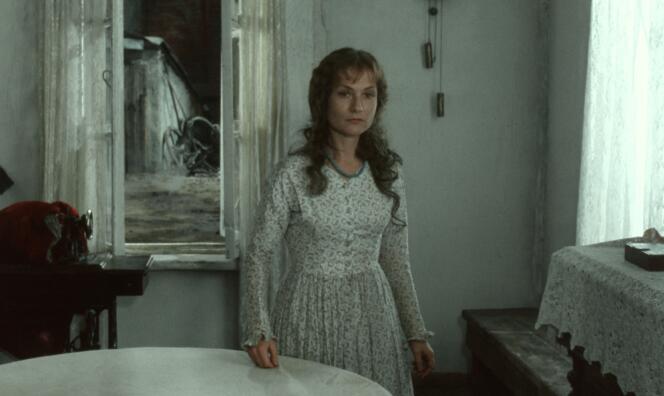We are grateful to the company Les Films du Camélia for bringing to the surface a little black pearl from the 1990s, from the time when France assumed its role as a patron of the arts producing expatriate films at home. Flooding (1994), Igor Minaiev’s third feature film, is indeed a French production, the work of a Ukrainian filmmaker born Soviet in Kharkiv (at the time Kharkov), in 1954 – who came to France at the end of the 1990s. 1980 –, adapted from another exile, the Russian writer Yevgeny Zamyatin (1884-1937), who made the same leap half a century earlier, in 1931, to write the screenplay for Lowlandsfor Jean Renoir (1894-1979).
This already shows the extent to which such a film zigzags on an axis culturally linking two imaginations on the borders of Europe. But Flooding is also a commission from an actress, Isabelle Huppert, who recognized in Zamyatin’s short story, published in Moscow in 1929 (reissued by Actes Sud, 80 pages, 6 euros), a tailor-made role. A role like a space to be inhabited by her, which she could fill with her redness calling for blood (we remember Violette Nozièrein 1978, The Pianist, in 2001), dig out of her unfathomable abyss, asking like any great actress a question directly to the viewer, straight in the eye.
Indoor theater
This role is that of Sofia, a housewife, wife of a steelworker with whom she lives on a ground floor overlooking a courtyard, in Petrograd (Saint Petersburg) in the 1920s, at the time of the “ new economic policy. To her husband, Trofim Ivanych (Boris Nevzorov, gruff as can be), she is unable to give birth to a child. During a troubled night of anguish, Sofia hatches a plan that seems like a precipice: to take into their home the orphan of a dead neighbor, Ganka (Macha Lipkina), 13 years old, propelled into the paws of a desperately husband impulse.
What was supposed to happen happens: Trofim, attracted by the young girl, abandons the marital bed for that of Ganka. Sofia copes with it, but did not anticipate the explosion caused when she catches them in the act. On a stormy evening when the Neva floods into streets and apartments, it only takes a little for the pot to explode.
We recognize in this story a proven formula, that of the good old domestic melodrama (The Broken Lily, by David W. Griffith, 1919), which Minaiev takes further, fulfilling its frightening potential to the end. The film takes place mainly in this indoor theater, a field of marital and adulterous forces which gradually close in on the characters, without falling into the pure abstraction of the closed door. The filmmaker knows how to give this intimate scene a changing face. On the walls of the apartment, moving shadows move – vapors, flowing from a perpetual rain – as if the inexpressible emotions and troubled dreams of the characters were projected there. Something seems to ooze, well up, from the walls of the film, like a cry slowly rising to the surface.
You have 34.98% of this article left to read. The rest is reserved for subscribers.
